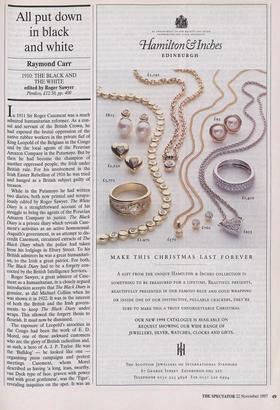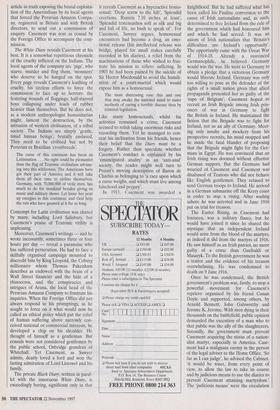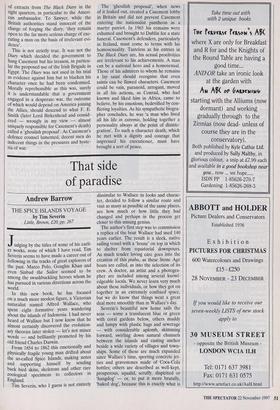All put down in black and white
Raymond Carr
1910: THE BLACK AND THE WHITE edited by Roger Sawyer Pimlico, £12.50, pp. 400 In 1911 Sir Roger Casement was a much admired humanitarian reformer. As a con- sul and servant of the British Crown, he had exposed the brutal oppression of the native rubber workers in the private fief of King Leopold of the Belgians in the Congo and by the local agents of the Peruvian Amazon Company in the Putamayo. But by then he had become the champion of another oppressed people, the Irish under British rule. For his involvement in the Irish Easter Rebellion of 1916 he was tried and hanged as a British subject guilty of treason.
While in the Putamayo he had written two diaries, both now printed and scrupu- lously edited by Roger Sawyer. The White Diary is a straightforward account of his struggle to bring the agents of the Peruvian Amazon Company to justice. The Black Diary is a private diary which reveals Case- ment's activities as an active homosexual. Asquith's government, in an attempt to dis- credit Casement, circulated extracts of The Black Diary which the police had taken from his lodgings in Ebury Street. To his British admirers he was a great humanitari- an, to the Irish a great patriot. For both, The Black Diary had to be a forgery con- cocted by the British Intelligence Services.
Roger Sawyer, a great admirer of Case- ment as a humanitarian, in a closely argued introduction accepts that The Black Diary is genuine, as did Michael Collins when he was shown it in 1922. It was in the interest of both the British and the Irish govern- ments to keep The Black Diary under wraps. This allowed the forgery thesis to flourish. It must now be dismissed.
The exposure of Leopold's atrocities in the Congo had been the work of E. D. Morel, one of those awkward customers who are the glory of British radicalism and, as such, a hero of A. J. P. Taylor. He was the 'Bulldog' — he looked like one organising press campaigns and protest meetings. Casement, whom Morel described as having 'a long, lean, swarthy, van Dyck type of face, graven with power and with great gentleness', was the 'Tiger', revealing iniquities on the spot. It was an article in truth exposing the brutal exploita- tion of the Amerindians by its local agents that forced the Peruvian Amazon Compa- ny, registered in Britain and with British directors, to send out a commission of enquiry. Casement was sent as consul by the Foreign Office to accompany the com- mission.
The White Diary reveals Casement at his best. It is a somewhat repetitious chronicle of the cruelty inflicted on the Indians. The local agents of the company are 'pigs', who starve, murder and flog them, 'monsters' who deserve to be hanged on the spot. Every page reveals Casement's loathing of cruelty, his tireless efforts to force the commission to face up to horrors: the festering wounds of floggings; half-starved boys collapsing under loads of rubber heavier than themselves. But he does not, as a modern anthropologist humanitarian might, lament the destruction, by the intrusion of western civilisation, of a tribal society. The Indians are simply 'gentle, timid human beings', brutally enslaved. They need to be civilised but not by Peruvian or Brazilian 'crossbreeds'.
The curse of this continent has been its Latinisation . .. No sight could be pleasanter than the flag of Teutonic civilisation advanc- ing into this wilderness. The Americans have got their part of America and it will take them all their time to civilise themselves. Germany, with 70,000,000 of virile men, has much to do for mankind besides giving us music and military shows. Let loose her pent up energies in this continent, and God help the rats who have gnawed at it for so long.
Contempt for Latin civilisation was shared by many, including Lord Salisbury, but Casement's praise of Teutonic virility is unpleasing.
Moreover, Casement's writings — and he wrote incessantly, sometimes three or four hours per day — reveal a paranoiac who has suffered persecution. He had to face a skilfully organised campaign mounted to discredit him by King Leopold, the Coburg millionaire whom Thomas Pakenham describes as endowed with the brain of a Wall Street financier and the hide of a rhinoceros, and the conspiracies and intrigues of Arana, the local head of the Peruvian Amazon Company to frustrate his inquiries. When the Foreign Office did not always respond to his promptings, as he sought to force on it what would now be called an ethical policy which put the relief of human suffering above narrowly con- ceived national or commercial interests, he developed a chip on his shoulder. He thought of himself as a gentleman. But consuls were not considered gentlemen by the public school, Oxbridge grandees of Whitehall. Yet Casement, as Sawyer admits, dearly loved a lord and won the lasting admiration of Lord Listowel and his family.
The private Black Diary, written in paral- lel with the innocuous White Diary, is exceedingly boring, significant only in that it reveals Casement as a hyperactive homo- sexual: 'Deep screw to the hilt', 'Splendid erections. Ramon 7.10 inches at least', `Splendid testemunhos soft as silk and big and full of life, no bush to speak of'. For Casement, Sawyer argues, homosexual encounters had become a drug, an emo- tional release (his intellectual release was bridge, played for small stakes carefully recorded in his diaries), a relief from the machinations of those who wished to frus- trate his mission to relieve suffering. In 1903 he had been pained by the suicide of Sir Hector Macdonald to avoid the humili- ation of a court-martial which would expose him as a homosexual: The most distressing case this and one that may awake the national mind to saner methods of curing a terrible disease than by criminal legislation.
Like many homosexuals, whilst his activities remained a crime, Casement seemed to relish taking enormous risks and recording them. Yet he managed to con- ceal his inclination from his friends, hence their belief that the Diary must be a forgery. Rather than speculate whether Casement's conduct is explained by his `emancipated anality' in an 'anti-anal' society, the reader might well turn to Proust's moving description of Baron de Charlus as belonging to 'a race upon which a curse weighs, and which must live among falsehood and perjury'.
In 1911, Casement was awarded a knighthood. But he had suffered what has been called his Pauline conversion to the cause of Irish nationalism and, as such, determined to free Ireland from the rule of the government which had honoured him and which he had served. It was an axiom of Irish nationalists that 'Britain's difficulties are Ireland's opportunity'. The opportunity came with the Great War of 1914-18. Already a convinced Germanophile, he believed Germany would win the war. He went to Germany to obtain a pledge that a victorious Germany would liberate Ireland. Germany was only too willing to pose as the defender of the rights of a small nation given that allied propaganda presented her as guilty of the `rape of Belgium'. Casement hoped to recruit an Irish Brigade among Irish pris- oners of war in Germany to fight the British in Ireland. He maintained the fiction that the Brigade was to fight for Ireland, not as an ally of Germany. Meet- ing only insults and mockery from his prospective recruits, his mind snapped and he made the fatal blunder of proposing that the Brigade might fight for the Ger- mans in Egypt. He was convinced that an Irish rising was doomed without effective German support. But the Germans had wearied of Casement and Casement was disabused of Teutons who did not behave like English gentlemen. They refused to send German troops to Ireland. He arrived in a German submarine off the Kerry coast in order to stop a rising. After wading ashore he was arrested and in June 1916 put on trial for treason.
The Easter Rising, as Casement had foreseen, was a military fiasco, but he would have joined it since he shared the mystique that an independent Ireland would arise from the blood of the martyrs, as indeed it did from the martyrs of 1916. He saw himself as an Irish patriot, no more guilty of a crime than Garibaldi or Masaryk. To the British government he was a traitor and the evidence of his treason overwhelming. He was condemned to death on 9 June 1916.
Once he was condemned, the British government's problem was, firstly, to stop a powerful movement for Casement's reprieve organised by his friend Conan Doyle and supported, among others, by Arnold Bennett, John Galsworthy and Jerome K. Jerome. With men dying in their thousands on the battlefield, public opinion demanded the execution of a man who to that public was the ally of the slaughterers. Secondly, the government must prevent Casement acquiring the status of a nation- alist martyr, especially in America. Case- ment had a malignant enemy in the person of the legal adviser to the Home Office. 'So far as I can judge', he advised the Cabinet, `it would be wiser, from every point of view, to allow the law to take its course and by judicious means to use the diaries to prevent Casement attaining martyrdom.' The 'judicious means' were the circulation of extracts from The Black Diary in the right quarters, in particular to the Ameri- can ambassador. To Sawyer, while the British authorities stand innocent of the charge of forging the diary, 'they remain open to the far more serious charge of exe- cuting a man on the basis of irrelevant evi- dence'.
This is not strictly true. It was not the Diary which decided the government to hang Casement but his treason, in particu- lar the proposed use of the Irish Brigade in Egypt. The Diary was not used in his trial as evidence against him but to blacken his character once he had been condemned. Morally reprehensible as this was, surely it is understandable that a government engaged in a desperate war, the outcome of which would depend on America joining the Allies, should descend to what F. E. Smith (later Lord Birkenhead and consid- ered — wrongly in my view — almost uniquely responsible for Casement's death) called a 'ghoulish proposal'. As Casement's defence counsel lamented, decent men do indecent things in the pressures and hyste- ria of war. The 'ghoulish proposal', when news of it leaked out, created a Casement lobby in Britain and did not prevent Casement entering the nationalist pantheon as a martyr patriot. In 1965 his remains were exhumed and brought to Dublin for a state funeral. Casement's defenders, particularly in Ireland, must come to terms with his homosexuality. Tasteless as his entries in The Black Diary are, his sexual proclivities are irrelevant to his achievements. A man can be a national hero and a homosexual. Those of his admirers to whom he remains a lay saint should recognise that even saints can be flawed characters. Casement could be vain, paranoid, arrogant, moved in all his actions, as Conrad, who had known and liked him in Africa, came to believe, by his emotions, bedevilled by con- flicting loyalties. As his sympathetic biogra- pher concludes, he was 'a man who lived all his life in extremis, holding together a personality always at the point of disinte- gration'. To such a character death, which he met with a dignity and courage that impressed his executioner, must have brought a sort of peace.




















































































 Previous page
Previous page